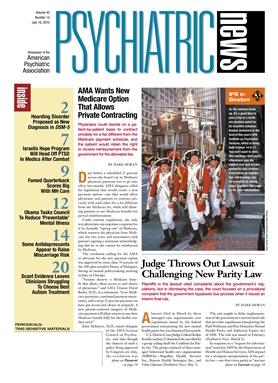The AMA will advocate for the repeal of state laws that prohibit people with mental illness from voting on the basis of membership in a diagnostic class.
The resolution, put forward by the Section Council on Psychiatry with support from six state delegations, was approved without debate or opposition at last month's meeting of the AMA House of Delegates. (The Section Council on Psychiatry consists of APA, the American Academy of Child and Adolescent Psychiatry, and the American Academy of Psychiatry and the Law.)
Forensic psychiatrist Barry Wall, M.D., author of the resolution and an alternate delegate from the American Academy of Psychiatry and the Law, told Psychiatric News that 38 states have laws that limit or prohibit people with mental illness from voting. He said that states should be able to regulate the ability to vote based on individual assessments of a person's functional capacity to vote, but should not be able to do so simply on the basis of a diagnosis. “The idea is that if someone is going to be prohibited from voting, it shouldn't be on a categorical basis,” he said.
He is director of forensic services at Eleanor Slater Hospital and a clinical associate professor of psychiatry at Brown University Medical School.
The AMA resolution states that “physicians have a duty to promote human well-being without discrimination, including advocating for the broad protection of civil liberties among patients” and that “legal criteria for which persons may be deemed incompetent to vote often focus on membership in a class based on illness (such as all persons under guardianship) rather than an assessment of a person's functional ability to vote.”
The resolution also states that “the move to individualized, functional determinations of the capacity to vote parallels similar advances in assessing capacity to consent to research or treatment or to complete an advance directive.”
In 2007, the American Bar Association (ABA) approved its own policy urging “federal, state, local, and territorial governments to ensure that no governmental entity exclude any otherwise qualified person from voting on the basis of medical diagnosis, disability status, or type of residence.”
The ABA policy also noted, “State constitutions and statutes that permit exclusion of a person from voting on the basis of mental incapacity, including guardianship and election laws, should explicitly state that the right to vote is retained, except by court order where the following criteria must be met: the exclusion is based on a determination by a court of competent jurisdiction; appropriate due process protections have been afforded; the court finds that the person cannot communicate, with or without accommodations, a specific desire to participate in the voting process; and the findings are established by clear and convincing evidence.”
In 2001, a federal court decision in Maine, Doe v. Rowe, established a functional standard for capacity to vote. The decision stated that “persons are considered incompetent to vote only if they lack the capacity to understand the nature and effect of voting such that they cannot make an individual choice.”
Using what has since become known as the “Doe Standard,” past APA President Paul Appelbaum, M.D., developed an instrument known as the Competency Assessment Tool for Voting (CAT-V). In a report published in the May 2009 Psychiatric Services, Appelbaum wrote that the instrument was an “easy and efficient method of determining voting capacity according to the Doe Standard” in 52 community-dwelling people with mental illness.
Performance on the test was high, with 92 percent scoring a 5 or 6 out of 6 possible points, and performance did not correlate with cognition, verbal IQ, or symptom severity.
Appelbaum, whose work was cited in the AMA resolution, called the resolution a “strong endorsement of the right of persons with mental illnesses to vote, unless specifically found incompetent to do so.”
“To this day, some states retain archaic restrictions on voting by people with mental illnesses, including those under guardianship, patients who have been hospitalized, and other groups—without regard to their actual abilities to vote,” Appelbaum told Psychiatric News. “Our research suggested that even most people with serious mental illnesses can meet reasonable standards for capacity to vote, and other work has shown that hospitalized patients display the same voting patterns as are found in the communities from which they came.
“The AMA resolution puts the AMA behind efforts to reduce the disenfranchisement of people with mental illnesses, and hence is a very positive step.”

